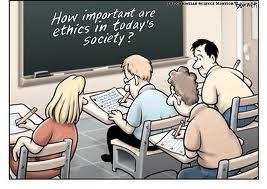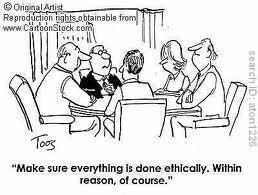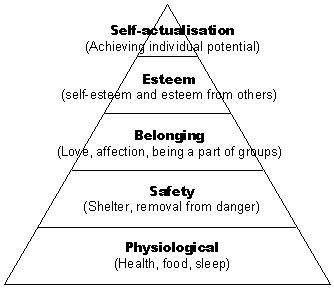 A Discussion of Ethics
A Discussion of Ethics
I have had many interesting and challenging discussions over the years and been asked a variety of questions. The ones that are among the most challenging to answer or even speak to are not the highly technical or mystical and deep, they are those pertaining to ethics. Any discussion of ethics involves morality and includes such notions as good and evil or right and wrong. This is sufficient to add layers of complexity to any situation. Questions of right and wrong are problematic by nature; I did a partial examination of such notions such in the essay “A Consideration of Opposites”.
Ethics are important to anyone on a personal or spiritual growth path, not so much as a measure of accomplishment rather as a way to gauge where you are or even what needs to be improved. They are important because without them progress is limited. Hence, the purpose of this essay is to make you aware of ethics as they pertain to daily life and not to have you judge yourself for the ethical challenges you may have. We all have ethical challenges; if we did not have them, we likely would not need to be here.
For those on a spiritual path, ethics take on deeper meaning and importance. That said, before we start this discussion, we need a basic definition of ethics. The following relatively simple one will suffice (source: http://dictionary.reference.com/browse/ethics):
Ethics
1. a system of moral principles: the ethics of a culture.
2. the rules of conduct recognized in respect to a particular class of human actions or a particular group, culture, etc.: medical ethics; Christian ethics.
3. moral principles, as of an individual: His ethics forbade betrayal of a confidence.
4. ( usually used with a singular verb ) that branch of philosophy dealing with values relating to human conduct, with respect to the rightness and wrongness of certain actions and to the goodness and badness of the motives and ends of such actions.
For the purpose of this piece, we will focus on the first three, as this essay itself is a form of #4. If you look at the definitions, the first thing that strikes you is there is no mention of right or wrong nor good or evil. The reason is that ethics is not as concerned with absolutes, it is purely relative. This is one of the reasons ethical questions are challenging ones.
The first two points in the definition of ethics include moral principles or the ethics of a culture. Every culture has a set of moral principles. The expectation is that those in the culture will follow them. The dominant religion and the history of the people in culture establish them. Outside influences can influence a culture, though it is still those within the culture collectively that will determine what that might be. Cultures change over time and though they appear rigid, they are not. Further, within each culture are sub-cultures that may have different interpretations of what is moral and acceptable.

Essentially, morals are rules of conduct; hence, what is ethical in one culture may not be so in another. The basis of morality is “rules” of what is considered right versus what is wrong. Religious notions of right and wrong most often drive this, though social pressures also influence these decisions. I must state that the writings in a book, be it the Bible or the Bhagavad Gita or the Quran, do not determine absolute right or wrong as no such thing exists. These are the constructs of humankind; however divinely inspired they may be.
I will digress for a moment, as it is important to note that, regardless of the ethic you follow, what matters in the end is the impact our choices have on us. At one time, sacrifices were part of many religions. Being acceptable within the culture, it would part of the cultures morality. While I do not know what would happen to anyone who openly disagreed, though I would expect there to be consequences for doing so. The question would be “is it right or wrong to sacrifice a life?”
Sure, we can look back and say that such acts were horrific, barbaric, evil or wrong. That said, there is no definitive answer to this for it depends, amongst other things, on what thoughts the people have about sacrificing a life, including why they do it. The fact one culture might condemn it does not necessarily make it wrong. Obviously, this is not an easy question to answer, though I believe you will have a better idea about it after reading this piece.
Now, people often refer to subsets of ethics, such as a work, personal and even shared ethic. We need not concern ourselves overly much with such subdivisions, as they are all part of our “personal ethic”. The notion of a personal ethic does not change the definition; it simplifies the discussion so we can examine individual choices. Of course, no examination of personal ethics can exclude the influence of cultural or group ethics of various kinds. We will look at this in due course.
Everyone has a personal ethic even though one may not have consciously considered what it might be. We develop our own ethics as we go through life. Our nature plays a key role, as does the circumstances of our upbringing (cultural thought forms we inherit), exposure to the ideas and beliefs and our reactions to experiences. Whenever we act, our Rational Mind (RM) is fully aware of why we chose a particular action, as a result, it attributes outcomes or consequences to the choices we make and why we made them. We may not be consciously aware of the reasons; this does not absolve us from the consequences of the choice.
In any spiritual discussion of ethics, there is the notion of karma to consider. Ethics and karma are not the equivalent. Ethics are a system we follow and karma is the direct and unavoidable consequence of volition. Hence, we can take on karma for what may be an ethical choice and an action that may be unethical, in a given context, may not result in karma. Remember, ethics are, in the end, personal. They guide our choices, our reactions to experiences.
The above paragraph relates to the question I posed earlier, “Is it right or wrong to sacrifice a life?” It is not a matter of right or wrong as much of whether volition was involved. In the case of sacrifices, the question is “why are they being done?”
We find another example in the question of whether or not we get karma when we hunt and kill the game we need to survive. I would say no or certainly very little, as long as the person has no other means of sustenance. One could then argue that, knowing what we know now, one could avoid this altogether by becoming a vegetarian. Yet, it is merely a matter of degrees. In the end, we must eat something that was living in order to continue to live ourselves. Unless you are able to manifest sustenance for your body out of the energies around us, you must eat to live.
This is also a related to ethics as it is still considered moral in most cultures to hunt for your food (disagreement by many notwithstanding). Since ethics are personal, whether it is ethical or not for the person hunting depends on whether they feel it is right to hunt and kill game regardless of whether their culture approves or not.
Ethics do not appear in isolation or develop overnight; they evolve out of our integration of experiences. They evolve as we do and their foundation is our values and individual beliefs. One does not arbitrarily decide that it is ethical to treat people fairly; one must first have values that lead one to a belief this is how to be otherwise the belief is just a thought with no substance. An ethic, or our moral system, is a complex thought form that integrates our beliefs. In this case, once you have assigned value and built beliefs around it, in order to be true to your beliefs you must apply fair treatment to all. See the application of our beliefs as our ethic.
Ethics governs our choices and actions in relation to not just others, but also with ourselves. They come into play when we are making choices that have outcomes to anyone or anything. These outcomes do not have to affect something external; they could affect us such as when we lie to ourselves. There is no getting away from ethics, even for those viewed as unethical or lacking in ethics. In such a case, what appears to be a lack of ethics is simply ethics of a different level.
The two fundamental challenges with ethics are that we really do not understand what they are and they vary from person to person and while we may all be aware of common ethical views, we hold our own. Ethics are not absolutes, as I have mentioned.
We all encounter ethical challenges, notably when ethics are in conflict or the foundation of an ethic is contradictory beliefs, that being ones that are in opposition to each other. They are a primary tool for our learning and development. For example, an ethic that has one treating others fairly has its foundation in the idea that everyone has equal value and that we believe this idea to be true. If we are trying to uphold a high level of ethics, we will have problems if we do not actually believe that everyone has equal value.
Therefore, the challenge with ethics is when we are in a situation where two or more aspects of our ethics are involved and in conflict. This is what I refer to as the grey area. Continuing with the above example, say I believe that one should treat everyone fairly and that I believe that I must protect myself from all forms of harm or negative consequences. This will lead to ethical challenges in situations where I have my ethic calls for me to treat someone fairly yet doing so would cause me negative consequences. What I choose to do will tell me which ethic is more important to me or that I place the most value in. It will also tell me the level of my ethics. In general, one could say that we closer to being aligned with our true nature rather than our ego or “I” the higher the level of our ethics.
Ethics evolve and there are three recognized levels of moral development, which relate to ones ethics. I find the model useful if only for the reason is clearly illustrates the evolution of one’s awareness as they progress. The three levels are pre-conventional, conventional and principled.
The first level, pre-conventional is where the choice between “right and wrong” is based on the personal consequences involved, such as physical punishment, reward or exchange of favours. The second stage, conventional, indicates that one’s moral reside in maintaining expected standards and living up to the expectations of others. At the principled level, individuals make a clear effort to define ethical principles apart from the authority of the group(s) to which they belong, or society in general.
The research indicates that there are also stages of moral development, which are as follows:
Pre-conventional
- Sticking to the rules to avoid physical punishment
- Following the rules only when doing so is in your immediate interest
Conventional
- Living up to what is expected by the people close to you
- Maintaining conventional order by fulfilling obligations to which you have agreed
Principled
- Valuing rights of others and upholding absolute values and rights regardless of the majority’s opinion
- Following self-chosen ethical principles even if they violate the law (example Nelson Mandela)

One’s ethical level is not necessarily the same in all areas, though we likely will not notice this until we have a conflict such as the one mentioned above. We may be in pre-conventional in one area and perhaps conventional ones in another.
Earlier I spoke of volition, that is, it is thoughts that guide the actions listed above. This would indicate that it is our intentions that illustrate our ethics. In a way this is similar to the deontological view (Deontological ethics: http://en.wikipedia.org/wiki/Deontological_ethics), though I would disagree with the following notion:
“In deontology, an act may be considered right even if the act produces a bad consequence, if it follows the rule that “one should do unto others as they would have done unto them”, and even if the person who does the act lacks virtue and had a bad intention in doing the act.”
In particular, the idea that it would be right or ethical to do the act even if one had bad intentions. I get the lacking virtue should not necessarily be an issue as that could very well be why they do not have good intentions. However, I would argue that we show our ethics by our personal choices or volition. Therefore, we would have a low level of ethics if we acted with such intent.
That aside, the idea that there is a link between ethics intent is clearly appropriate. Our needs and wants underlie a significant portion of our intent. Therefore, we can associate this to a schema such as Maslow’s hierarchy of needs and wants.
Our RM and its programming guide our actions. Our needs are part of that programming. Maslow’s hierarchy has five levels of needs. They are as shown in the figure below.

If we now compare the ethical levels listed earlier with Maslow’s hierarchy, we can say that physiological and safety needs are associated with pre-conventional ethics, belonging and esteem with convention ethics and self-actualisation with principled ethics.
Each of us encounters situations where our ethics come in to play. It affects our conversations with and acts towards others, our thoughts about other people and the choices we make that affect others. From this, it should be obvious that our honesty also affects our level of ethics.
Ethics, being a thought form, have different levels. For example, thoughts about properties of things, such as “a thing is round” are lower plane thoughts and the thought of “all people deserve respect” is a higher order thoughts (I have covered this in other essays). Hence, the essential difference between the levels of ethics is the level at which ones core ethic resides.
A core ethic is one that is not subject to another ethic. To have a principled ethic one must have their beliefs and associated ethics at the highest level. In order to be able to accept consequences to themselves for choices one must not have lower order needs that can override it.
Let us say that I have offered to help someone move because everyone else refused to help and my offer was accepted. That offer is now my commitment. When the date draws near I find that something very important to me has come up and it conflicts my existing commitment. If my ethics are pre-conventional, I will assess which of the two benefits me more and choose the one that is. If I am conventional, then I will likely have to consider what others think about my choice and because I made the commitment to help I likely will choose to do so. If I am principled then I will help because it is what I committed to and my word is my bond.
The above seems simple enough. One might even say I could talk to the person and explain the situation and see if we could make arrangements so that I can do both. This is true, but what if the change cannot be made? Again, if one is principled they will keep their original commitment or find someone mutually agreed upon to take their place. The situation could have been avoided altogether if I had specified conditions such as if something should come up, perhaps providing examples, I would not be able to help. The person would then have had to decide if this condition was acceptable and would be wise to line up someone else to help just in case I cannot make it.
Let us take another example. There are many people making their living by selling things. Assume I am a furniture salesperson who has bills to pay at home. Without sales, I will have problems and could face serious consequences, which may include losing my job if I do not meet my quota. A customer comes into the store and I know I can persuade them to buy something regardless of whether they have plans to do so or not. I show them an item that I know they want and can get them to buy it by powers of persuasion. Is it ethical for me to do so?
If I get them to buy, it shows my level of ethics to be pre-conventional. I would not be able to say with any clarity whether doing so or not would illustrate a conventional level of ethics. However, if I am principled and my belief is that I should never take advantage of another person for personal gain then my ethics dictate that I not persuade them to buy something they did not intend to or do not need or perhaps cannot really afford. Some might argue that the person who is buying is in control and that I cannot make them do it. While this is true, there is still a matter of one's power of persuasion and whether it is ethical to take advantage of someone using it. For those on a spiritual path there are karmic consequences to taking advantage of others.

All this said, these are questions we can only answer for ourselves. What I have also learned is that each person has their own level of ethics, and that I cannot stand in judgment of others for theirs. People illustrate their level of ethics in everything they do, be it in their work, how they act or how they treat others. You can see your own beliefs in your ethics should you care to look.
There was a time when condemnation of those who were not normal heterosexuals reflected the societal moral. Those who disagreed and stood up for them often found themselves in harm’s way as a result. They took a principled stand regardless of the consequences. Everyone else was either acting with a pre-conventional or conventional level of ethics. The greater the consequences one face as a result of a principled ethic the harder it is to act upon. I would dare say that those who have the highest level of principled ethics are likely to be very spiritual people for I doubt mental strength alone is sufficient to hold such a level as one's commitment must come from a "higher place" and that place is our spirit not our thoughts.
It is not easy to be ethically principled. There can be very real consequences for those that are; however, being able to take a principled stand, for the most part, is what those who seek to spiritual grow spiritually should strive for. What remains for each of us is to determine what kind of person we want to be and then take steps to get there. To attain a principled level of ethics means examining our actions and choices in all situations and then working to develop the courage, strength and indeed love it takes to get there. One cannot be principles without these qualities.
We will not do so until we are ready, and not everyone is. It is extremely difficult to live life without needs if one does not take a spiritual approach to life otherwise one will always be able to justify a lower ethical choice. If you work at it, you will develop more personal power and in so doing will find it easier to elevate your ethic.
At the root of our ethic is our view of self. If we see ourselves as separate beings that must take care of our own needs or let our culture and those around us define our morals then we will not be able to do this. In order to be principled one must elevate certain ideals above all other considerations.
I realize I have used simple examples and that there can many issues in play in any given situation. What I have tried to do is share with you ideas for you to consider when you are confronting your own ethical choices. No one can answer such questions for you; they do not live your life and do not let them. If you choose to improve your ethic, what you should do is consider, in any situation, how you chose to act and why. The answers to these questions are the keys to improving your level of ethics.
© 2011 Allan Beveridge
References:
